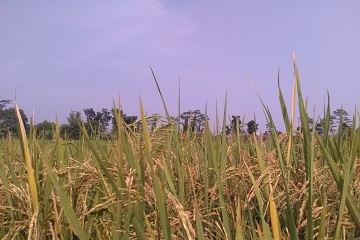IPB Researchers’ Collaboration with Agricultural Research and Development Agency to Overcome Bacterial Leaf Blight in Rice

Bacterial leaf blight is a disease caused by bacteria Xanthomonas oryzae pv oryzae. This species attacks every stage of rice crop, from nursery stage, panicles, until seed stages. This disease can lower the yield by 7.5%-23.8% in dry season and 20.6-35.6% in rainy season. Usually, farmers control this disease by applying bactericides that contain antibiotics.
However, using pesticide with antibiotics as an active substance to control plant disease is not recommended because it has been proven to cause resistant strains to develop. There is a concern that the resistance will transmit to other bacteria, including pathogenic bacteria in animals and humans, which will complicate the curing of infectious diseases.
This concern drives lecturers from Plant Protection Department, Faculty of Agriculture, Bogor Agricultural University (IPB), Dr. Giyanto and Dr. Kikin Hamzah Mutaqin alongside a researcher from Research Center of Biotechnology and Genetic Resources (BB Biogen), Agricultural Research and Development Agency, Wartono, SP, MSi, conducted a research about “Effectivity of Bacillus subtilis B12 Spore Formulation as a Controlling Agent of Bacterial Leaf Blight in Rice”.
“By using the microbe Bacillus subtilis B12, we can suppress the growth of bacterial leaf blight as well as other plant pathogens. This bacteria species is known as a producer of antibiotics such as Subtilosin, Bacitracin, Difficidin, Bacilysocin, etc. that can suppress the growth of bacteria or pathogenic fungi that attack rice. In our research, we will also see the effect of this isolate application to rice’s growth and development,” explained Dr. Giyanto.
Dr. Giyanto also explained that seed treatment and spraying of B. subtilis B12 spore formulation can also increase plant’s height and the number of its offsprings. That’s because B. subtilis administered can produce growth regulator substances such as cytokinin, acetat indole acid, and iturin. The ability to increase plants’ growth is also supported by this bacteria’s ability to dilute phosphate contained in the ground, converting it to available phosphate or to produce phosphatase enzyme, also to chelate iron by producing siderophore.
“Plant’ growth increase depends on the mutual interaction between B. subtilis B12 with the plant itself. B. subtilis B12 colonizes the roots because it needs metabolite compounds that are produced by the plant for nutrition. After accumulated in the plant’s roots, the bacteria will synthesize growth regulator substances. These substances can induce roots to grow even better. Well-developed roots will have better penetration force and better absorption of nutritions. This advantage is considered to be the reason why the plant has a better posture, more productive offsprings, and more yield,” Dr. Kikin added.
According to the research conducted by this team, it is proven that administering B. subtilis B12 spore formulation can suppress bacterial leaf blight by 21.7% and increase the yield of Ciherang variety rice by 55.6%.
“The best time for spraying is once per week, or bi-weekly,” said Dr. Kikin. (Ard)


